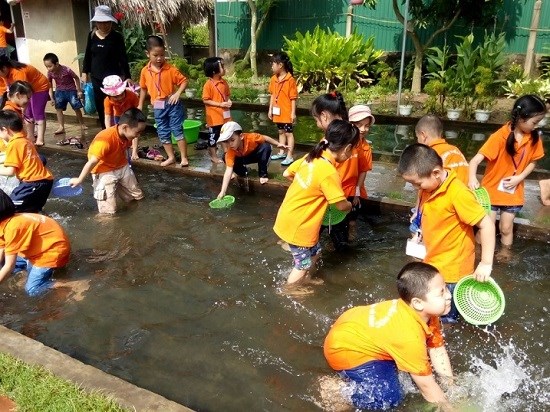Hanoi looks to boost eco-agriculture tourism
Flowers and ornamental trees grown in Hong Van commune, Hanoi's Thuong Tin district, have become not only farming products but also tourism ones. Farms, roads and houses in the suburban area are also destinations for visitors.
 Children catch fish at VietVillage - an eco-agriculture production farm offering tourism services in Hong Van commune, Thuong Tin district, Hanoi. (Photo: kinhtedothi.vn)
Children catch fish at VietVillage - an eco-agriculture production farm offering tourism services in Hong Van commune, Thuong Tin district, Hanoi. (Photo: kinhtedothi.vn)Hanoi (VNS/VNA) - Flowers and ornamental trees grown in Hong Van commune, Hanoi's Thuong Tin district, have become not only farming products but also tourism ones. Farms, roads and houses in the suburban area are also destinations for visitors.
In 2017, the commune hosted 35,000 visitors. By the end of last year, nearly 60,000 visitors arrived in the commune, helping it to gain over 6 billion VND (260,000 USD) from tourism.
Vice chairman of the Hong Van communal People’s Committee Mai Van Ngan said that the commune was well-known for its two flower villages – Xuyen Co and Co Giao for long.
However, in 2010, local owners of flower and ornamental tree farms faced bankruptcy due to the national economic slowdown, with few customers buying the trees.
In 2015, a model combining farming and tourism was first piloted in the commune, Ngan said.
Particular trees were chosen for each road to create typical features in the area, while households are encouraged to offer the experience of farming to visitors. Residents are called on to keep their houses clean as well as beautify their neighbourhood.
With the advantages of a suburban area, such as spacious farms, fresh air and short distance from the city centre – just 18 km – the commune is said to be a good choice for a 1-day tour.
“Thanks to feedback from visitors, we have improved our services and products,” Ngan said.
Nguyen Van Tu, head of the Hong Van Ornamental Trees Co-operative, said that with the advantage of available land, the co-operative grew nearly 10ha of ornamental trees and aquaculture under Vietnamese agricultural practices (VietGAP). Visiting the farm, people not only see, but also take part in farming activities.
The co-operative welcomes about 20,000 visitors and gains over 1 billion VND yearly from tourism services, Tu said.
Vice Director of the Hanoi Agriculture and Rural Development Department, Ta Van Tuong said since 2013, the city plans to develop eco-agriculture alongside tourism.
Organic agriculture production models which apply high technologies in large scale are expected to go hand in hand with tourism.
Until now, there were eight major farms and co-operatives doing eco-agriculture production associated with tourism, he said, adding that other farms also eyed developing such businesses.
Director of the department Chu Phu My said that eco-agriculture with tourism required land, investment in high tech and clean production models.
However, few policies and mechanisms were available to support the development of eco-agriculture, particularly eco-agriculture associated with tourism.
Director of the city’s Tourism Department Tran Trung Hieu said that the city still lacked a long-term vision and proper infrastructure to develop eco-agriculture tourism.
“Most of the eco-agriculture tourism models in the city feature little investment and innovation. Their products meet simple demands for food and accommodation,” Hieu said, adding that human resources for eco-agriculture tourism were also limited.
Ngo Kieu Oanh, Director of Ba Vì Homestead – an agriculture tourism provider in Hanoi’s Ba Vi district – said that farms and co-operatives which want to pursue eco-agriculture tourism should solve two main problems so they could attract more visitors.
Firstly, the farms and co-operatives should work closely with travel agents. Secondly, they should develop and introduce tourism products that feature typical cultural values of their hometowns.
Oanh said that the Government also plays a key role in boosting agricultural tourism.
The Government should develop policies in planning and preserving traditional trade villages as well as tightening the linkage between Governments at all levels and communities (including farming households, farms or co-operatives) in providing tourism services.
It was also necessary to develop standards for products of agriculture tourism.
When farmers joined the tourism industry, they also needed to be equipped with new skills, which required funding for training, she said./.













